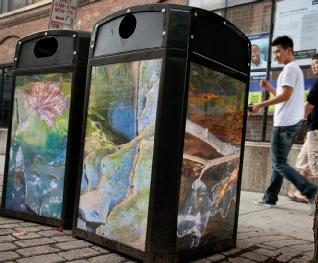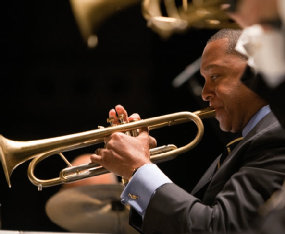University Launches $100 Million Faculty Initiative ; Endowment Up 10 Percent ; $10 Million Gift Endows Canine Genetics Program ; Architect Tapped to Design Gorge Bridge Barriers ; The New Math of Faculty Cuts ; Cornell Dairy Ice Cream Production Halted Until 2013 ; CU on List of Corporate Recruiters' Top Schools ; NSF Grants $109 Million for Synchrotron's X-ray Science ; Two Students Killed in Accidents ; Ithaca Is Top College Town ; Hotel Dean Reappointed ; Committee Tackles Budget ; Emeritus Trustees Elected

Teaching load: The University aims to recruit top new faculty as more professors reach retirement age. Here, Professor James Maas, PhD '66, lectures during his popular Psych 101 course in a packed Bailey Hall.
University Launches $100 Million Faculty Initiative
With record numbers of professors set to retire over the next decade, Cornell has launched a $100 million Faculty Renewal Fund in the hope of recruiting the best and brightest. Paid for through gifts and university funds, the initiative aims to step up hiring over the next five years. "Hiring new faculty is a clear sign that we are emerging healthier and better positioned for the future," President David Skorton said in a message e-mailed to the Cornell community. "This will allow us to build strength in strategically important areas and shape Cornell for a generation or more."
According to Provost Kent Fuchs, the initiative was inspired in part by the University's Strategic Plan, which makes faculty excellence a priority. That reflects a demographic reality: in 2008-09, nearly half the faculty was fifty-five or older, and nearly a third was sixty or older. Other universities are in the same boat and will be competing with Cornell for top candidates. On the bright side, from a hiring standpoint: the economic downturn means that there is a larger pool of potential hires. Says Arts and Sciences dean Peter Lepage: "The excellent faculty we hire now, at various stages in their careers, will do more than any other single factor to define our institution for the next few decades."
Endowment Up 10 Percent
Cornell's Investment Office has announced that the University's investments gained 12.6 percent during the fiscal year that ended on June 30, 2010. Thanks to this, the value of the endowment increased to $4.378 billion, up 10.4 percent over the previous fiscal year, and the value of the long-term investments (LTI)—which includes the endowment and two smaller funds—reached $4.432 billion, up 6.7 percent over the previous fiscal year. While the upward trend is encouraging, the LTI still lags 28 percent behind its value on June 30, 2008—prior to the financial crash—when it was $6.138 billion.
$10 Million Gift Endows Canine Genetics Program
A $10 million gift from an anonymous donor will fund the world's first canine genetics program. Announced in September, the gift is the single largest in the Vet college's history. It will support endowed professorships, faculty start-ups, DNA sequencing, and the DNA Bank, an archive of genetic material and medical information on inherited diseases. "With this gift," says Vet dean Michael Kotlikoff, "we will leverage the information embedded in canine genetics—available after hundreds of years of selective breeding— for the benefit of animals and humans."
This fall, the Vet college also celebrated the opening of its newest research facility. Located on Farrier Drive, the $70 million, 125,000-square-foot New York State Veterinary Diagnostic Lab upgrades and expands an existing facility—the only full-service, multidisciplinary animal disease diagnostic lab in the Northeast. Each year, it gets more than 300,000 samples and conducts more than 1 million tests.
Architect Tapped to Design Gorge Bridge Barriers
The University has hired an architect—Nader Tehrani of the Boston-based firm Office dA—to design permanent suicide-prevention barriers on gorge bridges. Emergency barriers were installed last spring after three undergrads took their own lives within weeks of each other, two of them dying on consecutive days. At the start of fall semester, the original chain-link fences were replaced by less obtrusive black fencing. Ithaca's Common Council has mandated that Cornell propose a design for permanent barriers by 2011, or remove the temporary ones.
The New Math of Faculty Cuts
The effects of Cornell's budget crunch have hit home in the mathematics department, which lost four of seven teaching positions staffed by postdoctoral assistant professors. According to a report in the Daily Sun, thirty-five lectures were eliminated and class size in some courses tripled. Several faculty members protested to the administration; in an e-mail, Professor Tara Holm said that the cuts put the department at a "serious disadvantage" compared to peer institutions. After a Sun editorial questioned whether the cuts were in conflict with the University's intention of "recruiting and retaining bright young faculty," Arts and Sciences dean Peter Le-page responded with a letter to the editor. He stated that "not a single tenure-track assistant professor in math or any other Arts and Sciences department lost his or her position as a result of the financial crisis" and concluded by emphasizing that the Arts college is "increasingly determined to focus our resources on hiring more great professors into our permanent faculty."
Cornell Dairy Ice Cream Production Halted Until 2013
Warning, ice cream fans: the current stock of Cornell Dairy frozen treats will likely last only through the middle of spring semester. Due to the $105 million renovation of Stocking Hall—home to both the Dairy Bar and Dairy Plant—the beloved campus ice cream shop has been shuttered until 2013. For now, Trillium Express is serving nineteen flavors of Cornell-made ice cream—but supplies are expected to run out within months. After that, Trillium will serve Perry's ice cream, an Upstate New York brand, until the new dairy plant is up and running.

Trash to treasure: To discourage littering, encourage recycling, and beautify Collegetown, the student-run Sustainability Hub has installed a decorative pair of recycling and trash cans on College Avenue. Located in front of the Kaplan Test Prep Center, the cans feature the work of local artist Helena Cooper and senior Tyler Armstrong. Two more trash/recycling stations are scheduled to be installed as funds are raised.
CU on List of Corporate Recruiters' Top Schools
Cornell has been ranked Number 14 on a list of state universities favored by corporate recruiters. Compiled by the Wall Street Journal, the list was topped by Penn State, followed by Texas A&M and the University of Illinois, Urbana-Champaign. "State universities have become the favorite of companies recruiting new hires because their big student populations and focus on teaching practical skills gives the companies more bang for their recruiting buck," the paper said. "Under pressure to cut costs and streamline their hiring efforts, recruiting managers find it's more efficient to focus on fewer large schools and forge deeper relationships with them."
NSF Grants $109 Million for Synchrotron's X-ray Science
The National Science Foundation will invest about $109 million in X-ray science at Cornell. Of the funds, $77 million will support the continued operation of the Cornell High Energy Synchrotron Source (CHESS) at least through March 2014. An additional $32 million will provide research and development funds toward the building of a next-generation X-ray facility, known as an energy recovery linac (ERL). Cornell's planned $500 million ERL would be the world's most capable X-ray source, with steady-state beams 1,000 times brighter than any in existence.

An Associated Press photo of people climbing the walls of the American embassy in Saigon is on display as part of "Exit Saigon, Enter Little Saigon: Vietnamese America Since 1975," the Smithsonian's first historical exhibit on the Vietnamese-American experience. Co-curated by Vu Pham, PhD '02, the traveling show began touring the U.S. in 2007. It's on view at the Rothschild's Building on the Ithaca Commons through December 4.
Two Students Killed in Accidents

Last year, the campus saw an unusually high number of student deaths—due to accident, illness, and suicide. The 2010-11 school year began with another loss: in late August, sophomore Khalil King was killed in an accidental fall into Fall Creek Gorge. The nineteen-year-old was last seen walking with a friend on an upper gorge trail in the early morning hours when he became frightened and ran. He was reported missing later that night, and his body was recovered the following afternoon. A native of Charlotte, North Carolina, King was in the process of transferring from CALS to the College of Architecture, Art, and Planning.
In early October, graduate student Jade Woods Moore was killed in a car accident in Ithaca. The twenty-four-year-old Master of Public Administration student was crossing Route 13 when her car collided with a tractor-trailer. A native of Boulder, Colorado, Moore graduated from Southeastern Oklahoma State University with a 4.0 GPA. Her husband also died from injuries sustained in the crash.

Jazz it up: In September, Wynton Marsalis and his Jazz at Lincoln Center Orchestra performed in Bailey Hall, raising more than $30,000 for mental health initiatives at Cornell. Musicians also mentored students on campus and at Ithaca High.
Ithaca Is Top College Town
For the second year in a row, Ithaca has been named the best college town by the American Institute for Economic Research. The nonprofit considered such criteria as cost of living, access to the arts, unemployment rate, research capacity, and diversity. Ithaca topped its division, towns of under 250,000 residents. Winners of the other size categories were San Francisco, San Jose, and Boulder.
Hotel Dean Reappointed
The executive committee of the Board of Trustees has voted unanimously to appoint Michael Johnson to a second five-year term as dean of the Hotel school. A longtime professor of marketing at the University of Michigan, Johnson joined the Cornell faculty in 2006. His second term ends in 2016. In other administration news, Cassandra Dembosky has been named university registrar. She had served in the position on an interim basis for the past year and a half.
Committee Tackles Budget
One of the toughest tasks of the "Reimagining Cornell" process involves designing a new budget model. "Creating one model that is simpler, more transparent, and more informed by data than the several unwieldy models the University currently uses will be a significant undertaking," said Elmira Mangum, vice president for planning and budget, in a statement announcing the formation of the budget redesign steering committee. Chaired by Mangum, the group includes vice presidents, deans, college officers, a senior vice provost, the budget director, and the university auditor. They hope to have their first set of changes in place for fiscal 2012.
Emeritus Trustees Elected
The Board of Trustees has elected four alumni as emeritus trustees, a distinction open to those who have served at least two terms. They are C. Morton Bishop III '74, Franci Blassberg '75, JD '77, Dwight Bush Sr. '79, and Martin Tang '70. The four, along with David Atkinson '60, were also elected presidential councilors, the highest honor the board can bestow.


